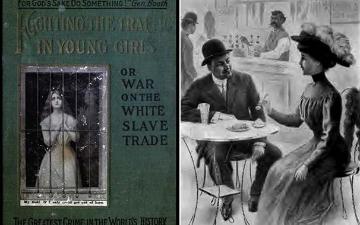
Illustrations on the cover and inside of the book “Fighting the Traffic in Young Girls or War on the White Slave Trade,” edited by Ernest Bell in 1910. Photo Source/Washington Post
Providing legal solutions to complicated moral dilemmas is not always ethical. Such legislation can inadvertently compound existing problems and lead to new ones. Efforts intended to end white slave trafficking in 1910 resulted in a variety of abuses and serves as a cautionary tale in the wake of the Dobbs decision that overturned Roe v. Wade.
Nancy C. Unger is Professor of History at Santa Clara University and a faculty scholar with the Markkula Center for Applied Ethics. She is writing a book on the 1913 Diggs and Caminetti white slave trafficking case, considering the ethics of efforts to legislate morality, with a particular focus on the often-unintended consequences of such legislation in the past.
Professor Unger authored the following article in a recent issue of the Washington Post in which she looks back to a case from 1913. Views are her own.
Read "The Supreme Court Letting States Mandate Morals Will end Badly."